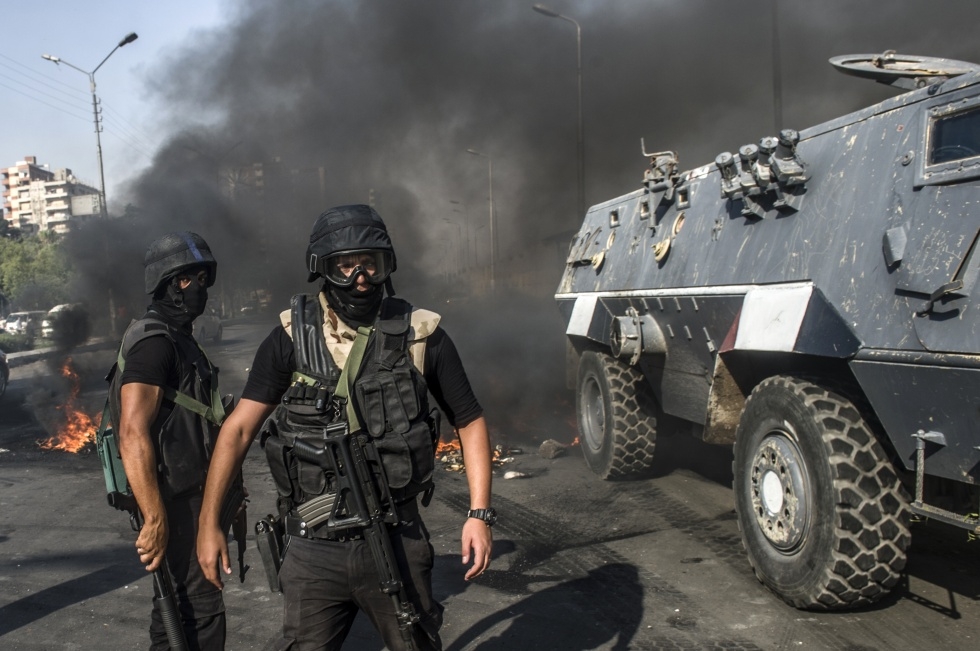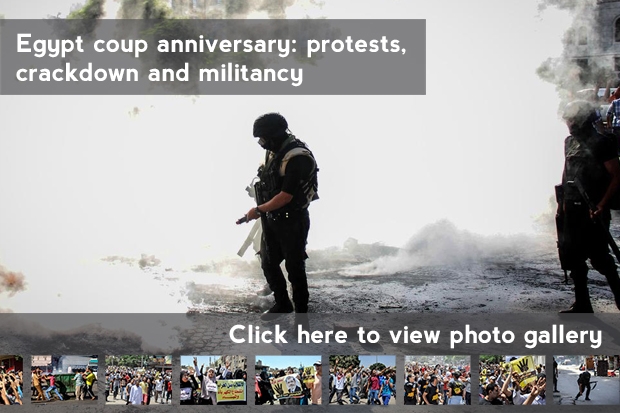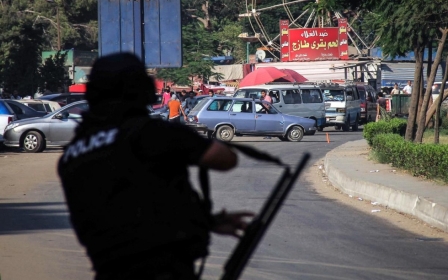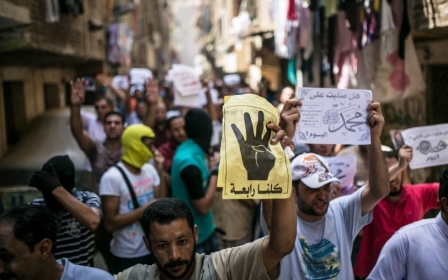Egypt coup anniversary: protests, crackdown and militancy

Supporters of ousted president Mohamed Morsi staged rallies on Friday to mark the passage of one year since the military coup that toppled the country's first democratically elected president.
The protests, which appear to be smaller in numbers and more spread out, come amid a continuous government campaign that seeks to silence dissent and amid a media blackout on voices who oppose to the coup.
Waving banners bearing Morsi's image, protesters called for his reinstatement and chanted slogans against President Abdel-Fattah al-Sisi, who led the army to oust Morsi last year.
In Morsi's hometown in the Nile Delta's Sharqiya province, protesters called for reinstating Morsi to power, amid chants against the military and police.
Protests were also reported from several other provinces across Egypt including Cairo, Giza, and the Nile Delta province of Beheira, Dakahliya and the central Assuit and Minya provinces.
Friday's protests came as part of a "day of rage" called for earlier by the National Alliance for the Defence of Legitimacy, pro-Morsi bloc, to mark the first anniversary of the democratically elected president's ouster.
Egyptian policemen on Thursday night dispersed a series of demonstrations by the backers of Morsi across the country.
Three protestors killed
And three protesters were reportedly killed during rallies staged by Morsi's supporters.
"The first is Mohamed Bahaa, a 21 year old MSA student who was killed by live ammunition to the stomach in Al-Haram Street. The second is Abdul-Rahman Hilal, a student in the Department of Agriculture in Cairo University and the third is Heba Gamal from Alexandria and who died with live ammunition," said a statement from Muslim Brotherhood London Press Office.
Since Morsi was deposed, at least 1,400 people, mostly his supporters, have been killed in street clashes and more than 15,000 imprisoned.
"The July 3 uprising (Thursday) will mark a start that will not stop ... and tomorrow will be an imposing Friday of rage," the Anti-Coup Alliance said in a statement calling for new protests.
Rights groups say the crackdown targeting Morsi supporters has been the bloodiest seen in Egypt in decades.
"A surge in arbitrary arrests, detentions and harrowing incidents of torture and deaths in police custody... provide strong evidence of the sharp deterioration in human rights in Egypt in the year since President Mohamed Morsi was ousted," Amnesty International said.
The repression has further divided Egypt, but the Brotherhood, which had won every vote since an uprising toppled veteran strongman Hosni Mubarak in 2011, still commands a loyal following.
"Let us turn our wealth of revolutionary defiance into an overwhelming power," the Anti-Coup Alliance said Wednesday.
Militant attacks
Meanwhile, nine people were wounded when a bomb hidden in a briefcase near a passenger seat exploded inside a train compartment in the Mediterranean city of Alexandria late Thursday, security officials and state media said.
A policeman was killed also by gunshot when his checkpoint was torched late Thursday in the capital, security officials said.
Police closed off several main squares in Cairo and scoured neighbourhoods to head off protests earlier on Thursday.
In the capital's Ain Shams district, black-clad riot policemen fired tear gas and shotguns to disperse a few dozen protesters who burned tyres on a road. Police also broke up protests elsewhere in Cairo.
Thirty-nine wanted activists were arrested ahead of Thursday's protests, and more than 200 demonstrators were detained during the day, the interior ministry said.
The ministry of health said at least 24 people were wounded in clashes nationwide.
Meanwhile, militants have launched scores of attacks that killed several hundred policemen and soldiers, mostly in the restive Sinai Peninsula.
And the military said troops killed 17 militants in northern Sinai and arrested three Thursday.
Egypt saw a string of limited explosions on Thursday, which bare the mark of militants.
Middle East Eye propose une couverture et une analyse indépendantes et incomparables du Moyen-Orient, de l’Afrique du Nord et d’autres régions du monde. Pour en savoir plus sur la reprise de ce contenu et les frais qui s’appliquent, veuillez remplir ce formulaire [en anglais]. Pour en savoir plus sur MEE, cliquez ici [en anglais].





